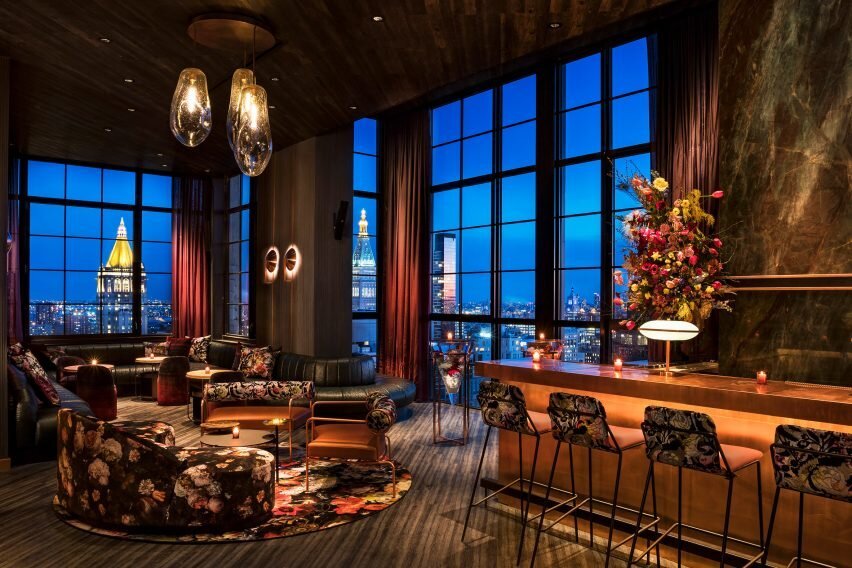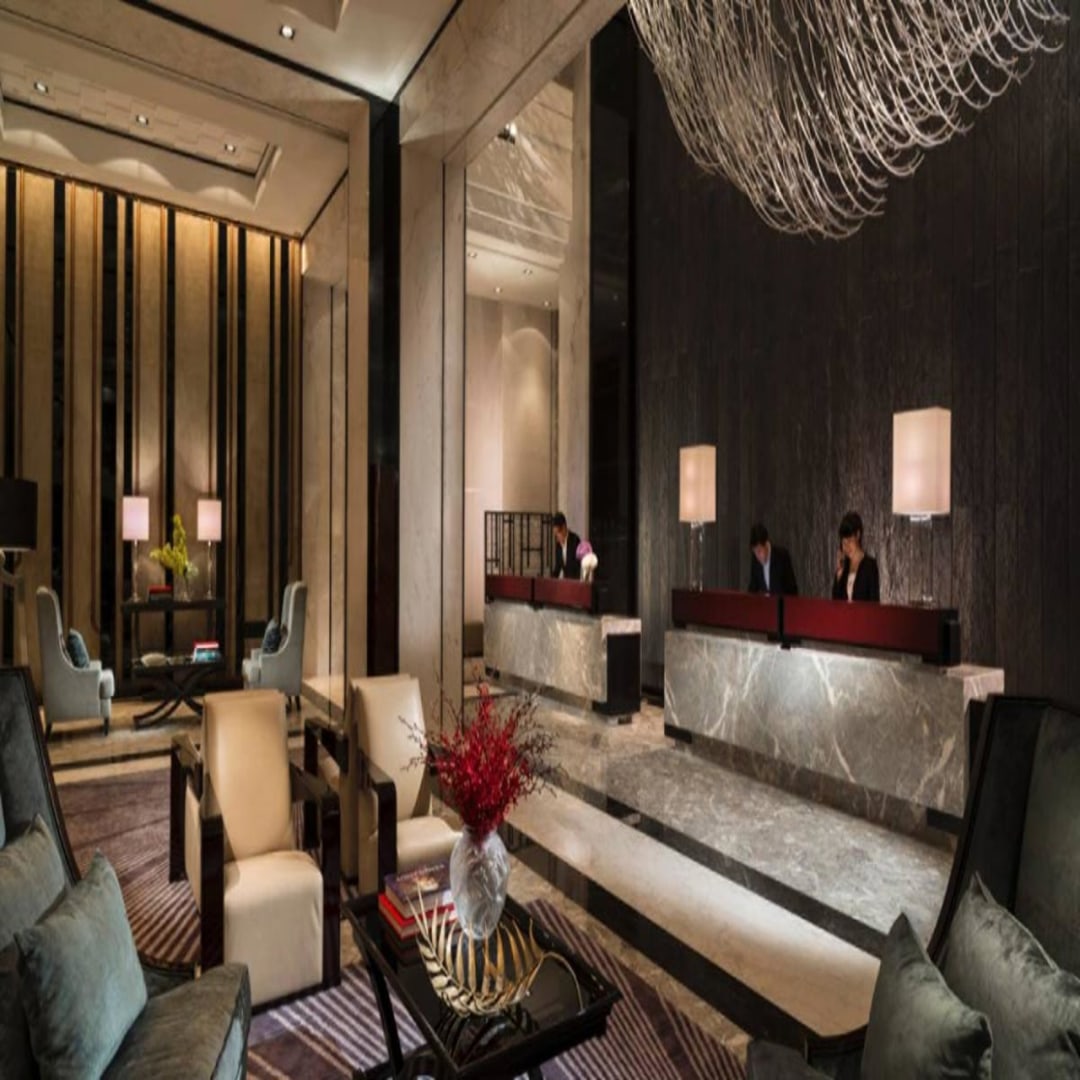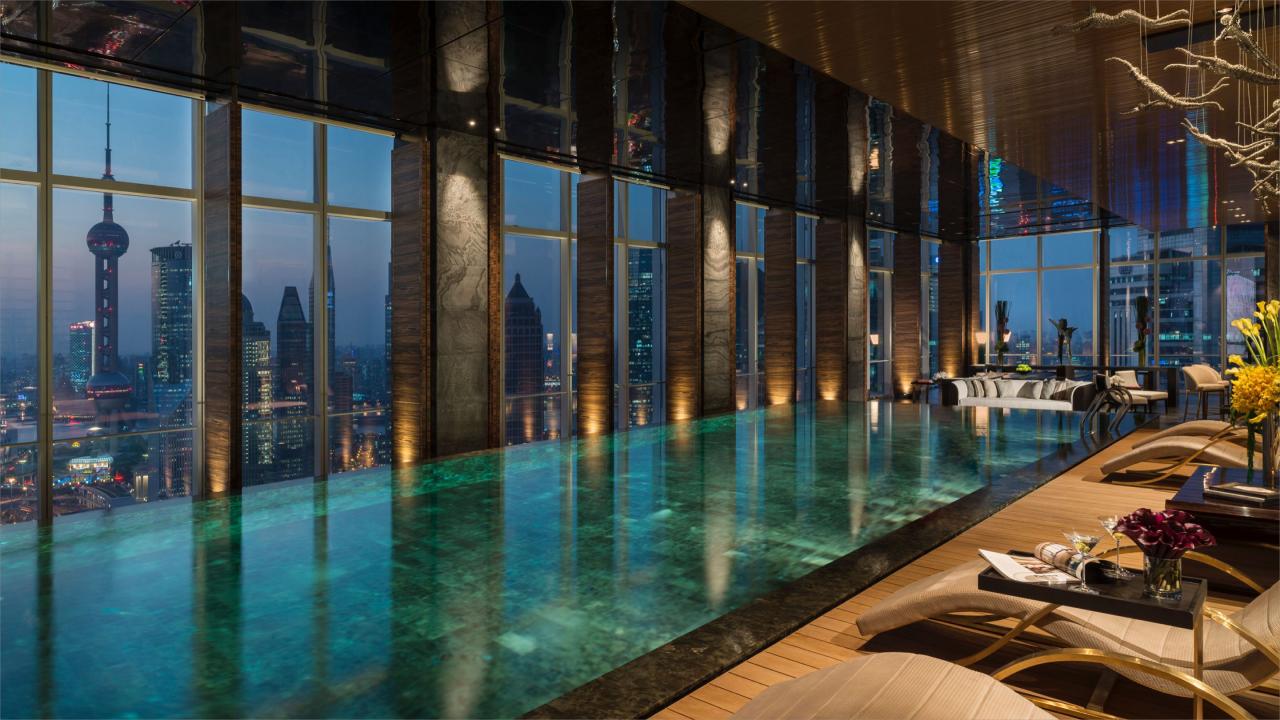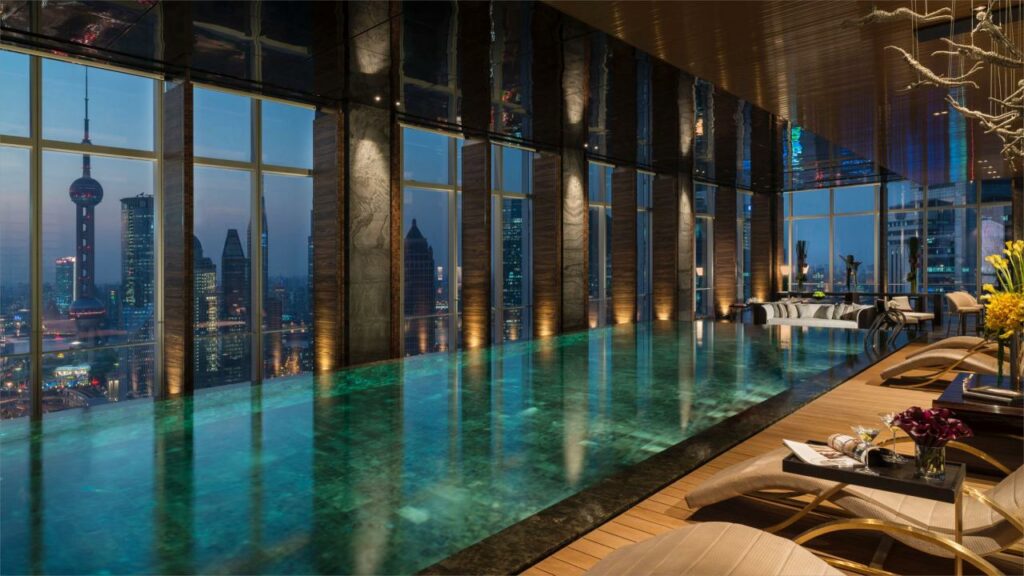Top rated luxury hotels offering bespoke experiences and personalized service are redefining the travel landscape. Forget cookie-cutter vacations; these havens craft unforgettable journeys tailored to individual desires. From meticulously curated itineraries to anticipating your every need, these hotels elevate hospitality to an art form. We delve into what makes these experiences truly exceptional, exploring the brands, services, and future trends shaping the ultimate luxury getaway.
This exploration covers everything from defining the hallmarks of luxury and bespoke experiences to analyzing guest reviews and the role of technology in enhancing personalized service. We’ll examine marketing strategies, future trends, and even answer some frequently asked questions about these exclusive escapes. Get ready to discover the world of unparalleled luxury and personalized pampering.
Defining “Luxury” and “Bespoke Experiences” in the Hotel Industry

Luxury in the hotel industry transcends mere opulence; it’s a meticulously crafted experience that caters to individual desires and elevates the guest journey beyond expectation. Bespoke experiences, integral to this definition, represent a personalized approach, moving beyond standardized services to create uniquely tailored moments for each guest. The distinction between luxury and standard hotels lies not just in amenities, but in the seamless integration of personalized service, exceptional attention to detail, and a commitment to exceeding expectations at every touchpoint.Luxury hotels offer a level of service and attention to detail far exceeding that of standard hotels.
While a standard hotel might focus on providing functional accommodations and basic amenities, luxury hotels prioritize creating an immersive and unforgettable experience. This involves anticipating guests’ needs, proactively addressing concerns, and providing personalized services that create lasting memories. The difference isn’t simply about the price point, but the holistic experience provided.
Differentiating Factors Between Luxury and Standard Hotels
The key differentiators between luxury and standard hotels extend beyond the obvious, like room size or the presence of a spa. Luxury hotels cultivate an atmosphere of exclusivity and personalized service. This is evident in aspects such as the staff-to-guest ratio, the level of training provided to staff, and the meticulous attention to detail in every aspect of the guest experience, from the quality of linens to the curated amenities provided.
Standard hotels, on the other hand, focus on efficiency and affordability, offering a functional but less personalized experience.
Examples of Bespoke Experiences Offered by High-End Hotels
High-end hotels are increasingly offering highly customized experiences. For instance, a hotel might arrange a private helicopter tour of a nearby landmark followed by a Michelin-starred dinner tailored to a guest’s dietary preferences. Another example could be a curated itinerary designed around a guest’s specific interests, perhaps a private wine tasting tour in a renowned vineyard or a bespoke shopping experience with a personal stylist.
The possibilities are virtually limitless, reflecting the hotel’s commitment to exceeding expectations and crafting truly unique moments.
Personalizing Guest Services to Create Unique Experiences, Top rated luxury hotels offering bespoke experiences and personalized service
Hotels personalize services in numerous ways, beginning with pre-arrival communication. This might involve understanding a guest’s preferences through detailed questionnaires or previous stay data, allowing the hotel to proactively prepare for their arrival. During the stay, personalization could manifest in customized room arrangements, tailored dining options, and proactive assistance with activities and excursions. Post-stay, personalized follow-up communications, such as handwritten thank-you notes or personalized recommendations, solidify the bespoke experience.
The focus is on anticipating needs and creating a seamless, personalized journey from beginning to end.
Key Elements Contributing to a Luxurious and Personalized Stay
Several key elements contribute to a truly luxurious and personalized stay. These include impeccable service – anticipating needs before they’re voiced; exceptional amenities – high-quality products and exclusive access; bespoke experiences – tailored activities and services; and a sense of exclusivity – creating a feeling of privacy and personalized attention. The combination of these elements, carefully orchestrated, defines the essence of a truly luxurious and memorable hotel experience.
The ultimate goal is not simply to meet expectations, but to surpass them consistently and create an experience that is both unforgettable and deeply personal.
Top-rated luxury hotels are renowned for their bespoke experiences and personalized service, catering to every whim. For the ultimate indulgence, consider checking out the top 10 most expensive hotels in the world with butler service , where pampering reaches new heights. Ultimately, the best luxury hotels elevate your stay beyond a simple vacation, transforming it into an unforgettable memory.
Top-Rated Luxury Hotel Brands and Their Unique Selling Propositions

The global luxury hotel market is fiercely competitive, with brands vying for the attention of discerning travelers seeking unparalleled experiences. Success hinges on offering not just opulent accommodations, but also meticulously crafted bespoke experiences that resonate with specific segments of the high-net-worth individual market. This exploration delves into three leading brands, analyzing their unique selling propositions and branding strategies.
Analysis of Three Top Luxury Hotel Brands
Three globally recognized luxury hotel brands exemplify the pinnacle of bespoke experiences: The Ritz-Carlton, Four Seasons Hotels and Resorts, and Aman. Each brand cultivates a distinct identity, appealing to different facets of the luxury travel market through unique service offerings and carefully curated brand narratives.
Unique Selling Propositions and Branding Strategies
The Ritz-Carlton’s unique selling proposition centers on its legendary personalized service. Their “Ladies and Gentlemen serving Ladies and Gentlemen” philosophy emphasizes anticipatory service and creating bespoke experiences tailored to individual guest preferences, often exceeding expectations with proactively offered amenities and services. This is reinforced through their consistent brand messaging emphasizing impeccable service and attention to detail. In contrast, Four Seasons Hotels and Resorts focus on creating a seamless, luxurious experience across all their properties, prioritizing consistency and a sophisticated, understated elegance.
Their branding emphasizes understated luxury and a sense of calm and tranquility, consistently delivered across diverse locations. Aman, on the other hand, distinguishes itself through its exclusive, tranquil retreats located in stunning, often remote, locations. Their unique selling proposition is an unparalleled sense of privacy and seclusion, combined with understated elegance and highly personalized service focused on wellness and rejuvenation.
Their branding leverages stunning photography and evocative language, emphasizing the serenity and escape offered by their properties.
Target Luxury Travel Segments
The Ritz-Carlton effectively targets a clientele seeking impeccable service and personalized attention to detail, often those who appreciate traditional luxury and a formal, yet warm, atmosphere. They appeal to a broad range of high-net-worth individuals, but their focus on personalized service particularly resonates with those who value bespoke experiences and appreciate the meticulous attention to detail. Four Seasons caters to a slightly broader demographic, attracting those who appreciate consistent quality, sophisticated elegance, and a seamless travel experience.
Their focus on family-friendly amenities and diverse property locations broadens their appeal while maintaining a high level of luxury. Aman successfully targets a more exclusive segment of luxury travelers seeking ultimate privacy, tranquility, and immersive cultural experiences. Their clientele typically values seclusion, wellness, and unique, often adventurous, travel experiences.
Comparative Table of Luxury Hotel Brands
| Hotel Brand | Price Point | Key Amenities | Target Demographic |
|---|---|---|---|
| The Ritz-Carlton | High (Luxury) | Personalized service, bespoke experiences, fine dining, spa facilities, butler service | High-net-worth individuals valuing personalized service and traditional luxury |
| Four Seasons Hotels and Resorts | High (Luxury) | Consistent high quality, family-friendly amenities, diverse locations, exceptional dining, spa services | Broader range of high-net-worth individuals valuing consistency, sophistication, and family-friendly options |
| Aman | Ultra-High (Luxury) | Secluded locations, personalized service, wellness focus, unique cultural experiences, exceptional privacy | High-net-worth individuals seeking ultimate privacy, tranquility, and unique, often adventurous, travel experiences |
Analyzing Guest Reviews to Identify Key Aspects of Bespoke Experiences

Understanding guest experiences is crucial for luxury hotels aiming to deliver truly bespoke services. Analyzing online reviews provides invaluable insights into what constitutes a memorable stay and where improvements can be made. By examining common themes and sentiments, hotels can refine their offerings and ensure they consistently meet—and exceed—guest expectations.
Common Themes and Sentiments in Guest Reviews Regarding Personalized Service
Guest reviews consistently highlight the importance of personalized attention and anticipatory service. Positive feedback often centers on staff who remember guest preferences, anticipate needs, and go above and beyond to create a seamless and memorable experience. Negative feedback, conversely, frequently points to impersonal interactions, lack of attention to detail, and unmet expectations regarding customized services. The difference between a truly exceptional stay and a merely satisfactory one often hinges on these subtle yet impactful details.
Specific Examples of Positive and Negative Feedback Related to Bespoke Experiences
Positive feedback often includes comments like: “The staff remembered my preference for a specific type of tea and had it waiting for me each morning,” or “The concierge arranged a private tour of the city tailored to my interests, exceeding my expectations.” Negative comments might include: “The staff seemed uninterested in my requests,” or “My special dietary needs were not accommodated, despite prior notification.” These contrasting examples highlight the importance of meticulous attention to detail and proactive communication.
Categorizing Guest Reviews: Staff Attentiveness, Amenity Quality, and Overall Experience
Guest reviews can be categorized to highlight specific aspects of the bespoke experience. Regarding staff attentiveness, reviews often focus on the staff’s knowledge, responsiveness, and ability to anticipate guest needs. For amenity quality, reviews assess the quality of the physical amenities, such as the room itself, spa facilities, and dining options, alongside the personalized touches added to enhance the experience.
Finally, overall experience reviews encapsulate the holistic impression of the stay, considering all aspects from check-in to check-out. A strong correlation exists between positive staff attentiveness, high-quality amenities, and a positive overall experience.
Hypothetical Guest Review Showcasing the Ideal Bespoke Experience
“From the moment I arrived, I felt truly valued. The staff greeted me by name, remembering my preferences from my previous stay. My room was impeccably appointed, with thoughtful touches reflecting my personal interests. The concierge arranged a private wine tasting at a local vineyard, perfectly tailored to my palate. Every interaction was seamless, every detail flawlessly executed. This wasn’t just a stay; it was a curated experience that exceeded all expectations. I felt pampered, appreciated, and truly understood. This hotel sets a new standard for bespoke luxury.”
The Role of Technology in Delivering Personalized Service: Top Rated Luxury Hotels Offering Bespoke Experiences And Personalized Service
In today’s hyper-connected world, luxury hotels are leveraging technology to redefine personalized service, moving beyond simple amenities to create truly bespoke experiences. This technological integration allows hotels to anticipate guest needs, tailor offerings, and enhance every aspect of the stay, from pre-arrival planning to seamless check-out. The result is a more efficient, engaging, and ultimately, luxurious experience for the discerning traveler.Technology’s impact on delivering bespoke experiences extends far beyond simple automation.
Top-rated luxury hotels are renowned for their bespoke experiences and personalized service, catering to every whim. This dedication to individual attention often extends to unparalleled wellness offerings, seamlessly integrating with the incredible spa experiences found in many ultimate luxury hotels worldwide offering unparalleled spa experiences. Ultimately, the best hotels understand that true luxury is about crafting a unique and unforgettable journey for each guest, from the moment they arrive to their departure.
It allows for a deeper understanding of individual guest preferences, enabling hotels to create highly personalized itineraries, curated recommendations, and seamless interactions throughout the guest journey. This level of personalization fosters a sense of anticipation and excitement, transforming a simple hotel stay into a memorable and luxurious experience.
Technological Innovations for Personalized Service
Several technological innovations are reshaping the landscape of luxury hospitality. AI-powered chatbots, for example, provide 24/7 guest support, answering queries instantly and proactively addressing potential issues. Imagine a chatbot anticipating a guest’s late arrival and automatically adjusting their room service order or notifying housekeeping to delay the evening turndown service. Furthermore, customized mobile apps provide guests with personalized itineraries, real-time updates on services, and the ability to control room features such as lighting and temperature, all from the convenience of their smartphones.
These apps often integrate with loyalty programs, offering exclusive deals and personalized recommendations based on past stays and preferences. Beyond these examples, facial recognition technology can expedite check-in and checkout processes, while smart room technology allows guests to control their environment with voice commands.
Benefits and Challenges of Technology Integration
The benefits of integrating technology are significant. Increased efficiency streamlines operations, reducing wait times and improving staff productivity. Enhanced personalization fosters stronger guest relationships, leading to higher satisfaction and loyalty. Data-driven insights allow hotels to understand guest preferences better, optimizing services and anticipating future needs. However, challenges exist.
The initial investment in technology can be substantial, and ongoing maintenance and updates are required. Data privacy and security are paramount concerns, requiring robust systems to protect guest information. Finally, striking a balance between technology and human interaction is crucial; technology should enhance, not replace, the personalized touch of exceptional staff.
Proactive Guest Need Anticipation Using Technology
Hotels can leverage technology to proactively address guest needs in several ways. By analyzing guest data, including past bookings, preferences, and online activity, hotels can predict needs before the guest even arrives. For instance, a guest who frequently books spa treatments might receive a personalized offer for a discounted massage upon arrival. Similarly, a guest with a history of requesting specific amenities could have those items pre-arranged in their room.
Real-time data from smart room technology can also identify potential issues, such as a malfunctioning air conditioner, allowing for immediate intervention before the guest even notices. This proactive approach transforms the guest experience from reactive to anticipatory, creating a truly seamless and personalized stay.
Marketing and Branding Strategies for Bespoke Experiences
Luxury hotels don’t just sell rooms; they curate experiences. Marketing bespoke services requires a shift from transactional advertising to a narrative-driven approach that highlights the unique, personalized touch offered to each guest. This involves showcasing the meticulous attention to detail and the creation of unforgettable memories, rather than simply listing amenities.Luxury hotels effectively market their unique bespoke experiences by emphasizing exclusivity and personalization.
This is achieved through targeted marketing campaigns that reach high-net-worth individuals and discerning travelers. These campaigns often leverage high-quality visuals and compelling storytelling to create an aspirational image and generate a desire for the unique experiences offered. The focus is on building a strong brand identity associated with exceptional service and personalized attention.
Storytelling and Visual Content in Showcasing Personalized Services
The power of storytelling is crucial in conveying the essence of bespoke experiences. Instead of simply stating “personalized service,” luxury hotels craft narratives around specific guest journeys. Imagine a video showcasing a couple celebrating their anniversary with a private chef preparing a gourmet meal on their balcony overlooking the ocean, followed by a couples massage under the stars.
This paints a vivid picture far more effectively than a list of amenities. High-quality photography and videography are essential, showcasing the hotel’s luxurious interiors, stunning locations, and the genuine smiles of happy guests enjoying their tailored experiences. The visual narrative should evoke feelings of relaxation, exclusivity, and unforgettable moments. Consider also the use of testimonials from satisfied guests; their authentic voices add credibility and emotional impact.
Marketing Materials Emphasizing Bespoke Experiences
A strong tagline succinctly captures the brand’s essence. For a hypothetical luxury hotel, “Your Story, Our Masterpiece” could be used. This tagline emphasizes the collaborative nature of the bespoke experience, where the hotel acts as a facilitator in creating a memorable stay tailored to the guest’s preferences.A short description could further elaborate: “At [Hotel Name], we believe in crafting unforgettable experiences, not just providing accommodations.
From curated itineraries and private chef experiences to personalized spa treatments and bespoke amenities, we meticulously design each stay to reflect your unique desires and create lasting memories.” This description clearly communicates the hotel’s commitment to personalization and the breadth of bespoke services offered.
Hypothetical Marketing Campaign: The “Culinary Curator” Experience
This campaign focuses on a specific bespoke offering: a personalized culinary journey at a fictional luxury hotel, “The Grand Azure.”The campaign centers around a “Culinary Curator” experience. Guests work with a dedicated chef to design a multi-course meal featuring their favorite dishes and ingredients, incorporating local delicacies and seasonal produce. The campaign utilizes high-quality photography and videography showcasing the process: from selecting ingredients in a vibrant local market to the chef preparing the meal in the guest’s private villa.
The visuals emphasize the artistry and personalization of the experience. The campaign also incorporates testimonials from previous guests who have enjoyed the “Culinary Curator” experience, highlighting their satisfaction and the unique memories created. Social media will play a key role, showcasing behind-the-scenes glimpses of the experience and engaging with potential guests. Targeted advertising will reach affluent travelers interested in culinary tourism and personalized experiences.
The campaign will utilize a variety of channels, including print advertisements in luxury travel magazines, online banner ads on high-end travel websites, and social media marketing campaigns.
The Future of Bespoke Experiences in Luxury Hotels

The luxury hotel industry is on the cusp of a transformative era, driven by evolving guest expectations and technological advancements. The future of bespoke experiences will be defined by a hyper-personalized approach, a deep commitment to sustainability, and a proactive adaptation to the ever-shifting preferences of discerning travelers. This evolution will redefine what constitutes a truly luxurious and memorable stay.
Emerging Trends in Personalized Luxury Hotel Services
Several key trends are shaping the future of personalized services. Artificial intelligence (AI) is playing an increasingly crucial role, enabling hotels to anticipate guest needs and preferences before arrival. For example, AI-powered systems can analyze past booking data, social media activity, and even real-time location data to curate a truly customized itinerary, from suggesting preferred dining options to pre-selecting spa treatments.
Furthermore, the rise of personalized wellness programs, tailored to individual health goals and preferences, represents another significant shift. Hotels are incorporating biometric data analysis and offering customized fitness regimes, nutrition plans, and mindfulness experiences, creating holistic wellness journeys rather than just spas. The integration of virtual and augmented reality (VR/AR) also offers exciting possibilities, allowing guests to virtually explore hotel amenities, preview rooms, or even engage in interactive experiences before their stay.
Imagine virtually “trying on” different room views or experiencing a virtual tour of a local attraction – all from the comfort of your home.
Sustainability and Ethical Considerations in Bespoke Experiences
The growing awareness of environmental and social responsibility is profoundly impacting the luxury travel sector. Guests are increasingly seeking hotels that prioritize sustainability and ethical practices. This translates into a demand for bespoke experiences that minimize environmental impact and support local communities. Hotels are responding by incorporating sustainable materials in their design and operations, sourcing local and organic food for their restaurants, partnering with local artisans and businesses to offer unique experiences, and actively reducing their carbon footprint through energy-efficient practices.
For instance, a hotel might offer a bespoke tour of a local organic farm, allowing guests to participate in the harvesting process and enjoy a farm-to-table meal prepared with their harvest. This approach not only provides a unique experience but also supports local farmers and reduces the hotel’s reliance on long-distance food transportation.
Adapting to Changing Guest Expectations Regarding Personalization
To remain competitive, luxury hotels must proactively adapt to the ever-evolving preferences of their guests. This involves investing in technology that facilitates seamless personalization, such as AI-powered chatbots for instant service requests and personalized recommendations. It also requires a shift in mindset, empowering staff to anticipate guest needs and offer proactive service. Data privacy and security are paramount; hotels must ensure that the collection and use of guest data are transparent and compliant with regulations.
Collecting feedback through various channels, from in-stay surveys to post-stay reviews, is crucial to understand guest preferences and tailor services accordingly. Analyzing this feedback helps identify areas for improvement and allows hotels to continuously refine their offerings to better meet individual needs. The goal is not simply to provide personalized services, but to create genuine, memorable experiences that exceed guest expectations.
A Concept for a Future Luxury Hotel Experience: The “Eco-Retreat”
Imagine a future luxury hotel experience centered around sustainability and hyper-personalization: the “Eco-Retreat.” This hotel would be built using sustainable materials and powered by renewable energy. Guests would be greeted with a personalized welcome package containing locally sourced products and a curated itinerary based on their interests and preferences, determined through a pre-arrival questionnaire and AI analysis. The hotel would offer bespoke wellness programs, including personalized yoga sessions, guided nature walks, and farm-to-table cooking classes featuring locally sourced ingredients.
Excursions would focus on sustainable tourism practices, such as visiting nearby wildlife reserves or participating in community-based conservation projects. Every aspect of the stay, from the room amenities to the dining options, would reflect a commitment to sustainability and a deep understanding of the guest’s individual preferences. The Eco-Retreat would not just be a hotel; it would be a sanctuary where luxury and sustainability coexist harmoniously, creating a truly unforgettable and responsible travel experience.


